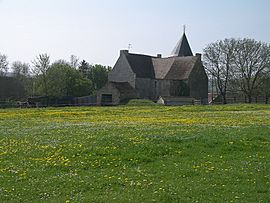Ouilly-le-Tesson facts for kids
Quick facts for kids
Ouilly-le-Tesson
|
|
|---|---|

Manoir
|
|
| Country | France |
| Region | Normandy |
| Department | Calvados |
| Arrondissement | Caen |
| Canton | Bretteville-sur-Laize |
| Intercommunality | Pays de Falaise |
| Area
1
|
12.00 km2 (4.63 sq mi) |
| Population
(2008)
|
530 |
| • Density | 44.2/km2 (114.4/sq mi) |
| Time zone | UTC+01:00 (CET) |
| • Summer (DST) | UTC+02:00 (CEST) |
| INSEE/Postal code |
14486 /14190
|
| Elevation | 67–165 m (220–541 ft) (avg. 160 m or 520 ft) |
| 1 French Land Register data, which excludes lakes, ponds, glaciers > 1 km2 (0.386 sq mi or 247 acres) and river estuaries. | |
Ouilly-le-Tesson is a small French village, also known as a 'commune'. It is located in the northwest of France, in a region called Basse-Normandie. This charming commune is part of the Calvados department.
Contents
Discovering Ouilly-le-Tesson
Ouilly-le-Tesson is a quiet place in the French countryside. It offers a glimpse into traditional French village life. The commune is known for its peaceful atmosphere.
Location and Geography
Ouilly-le-Tesson is situated in the Calvados department. This department is in the Basse-Normandie region. It is found in the northwest part of France. The village is part of the Caen arrondissement. An arrondissement is a type of administrative district.
The commune covers an area of about 12 square kilometers (4.6 square miles). Its elevation, or height above sea level, varies. The lowest point is 67 meters (220 feet). The highest point reaches 165 meters (541 feet). The average elevation is around 160 meters (525 feet).
Population and Community
As of 2008, Ouilly-le-Tesson had a population of 530 people. This makes it a small and close-knit community. The people who live in a commune are called its inhabitants.
Local Government
Like all French communes, Ouilly-le-Tesson has a local government. This government is led by a mayor. The mayor is responsible for managing the village's daily affairs. From 2008 to 2014, the mayor was Christine Hoflack. The commune is also part of a larger group of communities. This group is called "Pays de Falaise." This helps different villages work together on projects.
See also
 In Spanish: Ouilly-le-Tesson para niños
In Spanish: Ouilly-le-Tesson para niños



